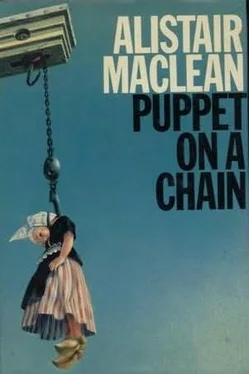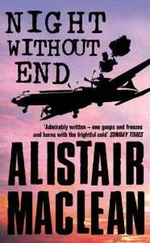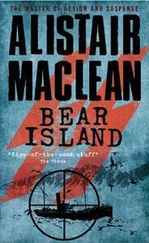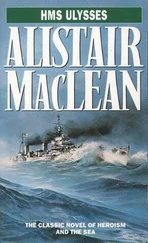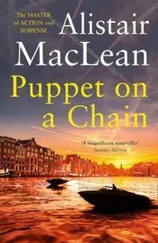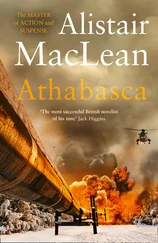The room I found myself in was about half the size of the church above. I made another quick circuit with the torch. There were no windows here, just two naked overhead lights. I located the switch and switched it on. The room was even more blackened than the church proper. The rough wooden floor was filthy with the trampled dirt of countless years. There were some tables and chairs in the centre of the room and the two side walls were lined with half-booths, very narrow and very high. The place looked like a medieval café.
I felt my nostrils twitch involuntarily at a well-remembered and unloved smell. It could have come from anywhere but I fancied it came from the row of booths on my right. I put my torch away, took my pistol from its felt underarm holster, dug in a pocket for a silencer and screwed it on. I walked cat-footed across the room and my nose told me that I was heading in the right direction. The first booth was empty. So was the second. Then I heard the sound of breathing. I moved forward with millimetric stealth and my left eye and the barrel of the pistol went round the corner of the third booth at the same instant.
My precautions were unnecessary. No danger offered here. Two things rested on the narrow deal table, an ashtray with a cigarette end burnt away to the butt, and the arms and head of a man who was slumped forward, sound asleep, his face turned away from me. I didn't have to see his face. George's gaunt frame and threadbare clothes were unmistakable. Last time I'd seen him I'd have sworn that he would have been unable to stir from his bed for the next twenty-four hours — or I would have sworn, had he been a normal person. But junkies in an advanced state of addiction are as far from normal as any person can ever become and are capable of astonishing if very brief feats of recovery. I left him where he was. For the moment, he presented no problem.
There was a door at the end of this room between the two rows of booths. I opened it, with rather less care than previously, went inside, located a switch and pressed it.
This was a wide but very narrow room, running the full width of the church but no more than ten feet across. Both sides of the room were lined with shelves and those shelves were stacked high with Bibles. It came as no surprise to discover that they were replicas of those I had examined in the warehouse of Morgenstern and Muggenthaler, the ones that the First Reformed Church handed out with such liberality to the Amsterdam hotels. There didn't seem to be anything to be gained by having another look at them so I stuck my gun in my belt and went ahead and looked at them anyway. I picked several at random from the front row on a shelf and flicked through them: they were as innocuous as Bibles can be, which is as innocuous as you can get. I jerked into the second row and the same cursory examination yielded up the same result. I pushed part of the second row to one side and picked up a Bible from the third row.
This copy may or may not have been innocuous, depending upon your interpretation of the reason for its savagely mutilated state, but as a Bible as such it was a complete failure because the hole that had been smoothly scooped out from its centre extended almost the entire width of the book: the hole itself was about the size and shape of a large fig. I examined several more Bibles from the same row. all had the same hollowed out centre, obviously machine-made. Keeping one of the mutilated copies to one side, I replaced the other Bibles as I had found them and moved towards the door opposite the one by which I'd entered the narrow room. I opened it and pressed the light switch.
The First Reformed Church, I had to admit, had certainly done their level and eminently successful best to comply with the exhortations of the avant-garde clergy of today that it was the Church's duty, to keep abreast with and participate in the technological age in which we live. Conceivably, they might have expected to be taken a degree less literally, but then unspecified exhortation, when translated into practice, is always liable to a certain amount of executive misdirection, which appeared to be what had happened in this case: this room, which took up nearly half the basement area of the church, was, in fact, a superbly equipped machine shop.
To my untrained eye, it had everything — lathes, milling machines, presses, crucibles, moulds, a furnace, a large stamping machine and benches to which were bolted a number of smaller machines whose purpose was a mystery to me. One end of the floor was covered with what appeared to be brass and copper shavings, for the main part lying in tightly twisted coils. In a bin in one corner lay a large and untidy heap of lead pipes, all evidently old, and some rolls of used lead roof sheathing. Altogether, a highly functional place and one clearly devoted to manufacture: what the end products were was anyone's guess for certainly no examples of them were lying around.
I was half-way along the room, walking slowly, when I as much imagined as heard the very faintest sensation of sound from about the area of the doorway I'd just passed through: and 1 could feel again that uncomfortable tingling sensation in the back of my neck: someone was examining it, and with no friendly intent, from a distance of only a very few yards.
I walked on unconcernedly, which is no easy thing to do when the chances are good that the next step you take may be anticipated by a.38 bullet or something equally lethal in the base of the skull, but walk I did, for to turn round armed with nothing but a hollowed-out Bible in my left hand — my gun was still in my belt — seemed a sure way of precipitating that involuntary pressure of the nervous trigger-finger. I had behaved like a moron, with a blundering idiocy for which I would have bawled out anyone else, and it looked very much as if I might pay the moron's price. The unlocked main door, the unlocked door leading to the basement, the access free and open to anyone who might care to investigate bespoke only one thing: the presence of a quiet man with a gun whose job it was not to prevent entry but to prevent departure in the most permanent way. I wondered where he had been hiding, perhaps in the pulpit, perhaps in some side door leading off the stairs, the existence or otherwise of which I'd been too careless to investigate.
I reached the end of the room, glanced slightly to my left behind the end lathe, made a slight murmur of surprise and stooped low behind the lathe. I didn't stay in that position for more than two seconds for there seemed little point in postponing what I knew must be inevitable: when I lifted the top of my head quickly above the lathe, the barrel of my silenced gun was already lined up with my right eye.
He was no more than fifteen feet away, advancing on soundless rubber moccasins, a wizened, rodent-faced figure of a man, with a paper-white face and glowing dark-coal eyes. What he was pointing in the general direction of the lathe in front of me was far worse than any.38 pistol, it was a blood-chilling whippet, a double-barrelled twelve-bore shotgun sawn off at both barrels and stock, probably the most lethally effective short-range weapon ever devised.
I saw him and squeezed the trigger of my gun in the same moment, for if anything was certain it was that I would never be given a second moment.
A red rose bloomed in the centre of the wizened man's forehead. He took one step back, the reflex step of a man already dead, and crumpled to the floor almost as soundlessly as he had been advancing towards me, the whippet still clutched in his hand. I switched my eyes towards the door but if there were any reinforcements to hand they were prudently concealing the fact. I straightened and went quickly across the room to where the Bibles were stored, but there was no one there nor was there in any of the booths in the next room where George was still lying unconscious across his table.
Читать дальше
Конец ознакомительного отрывка
Купить книгу
